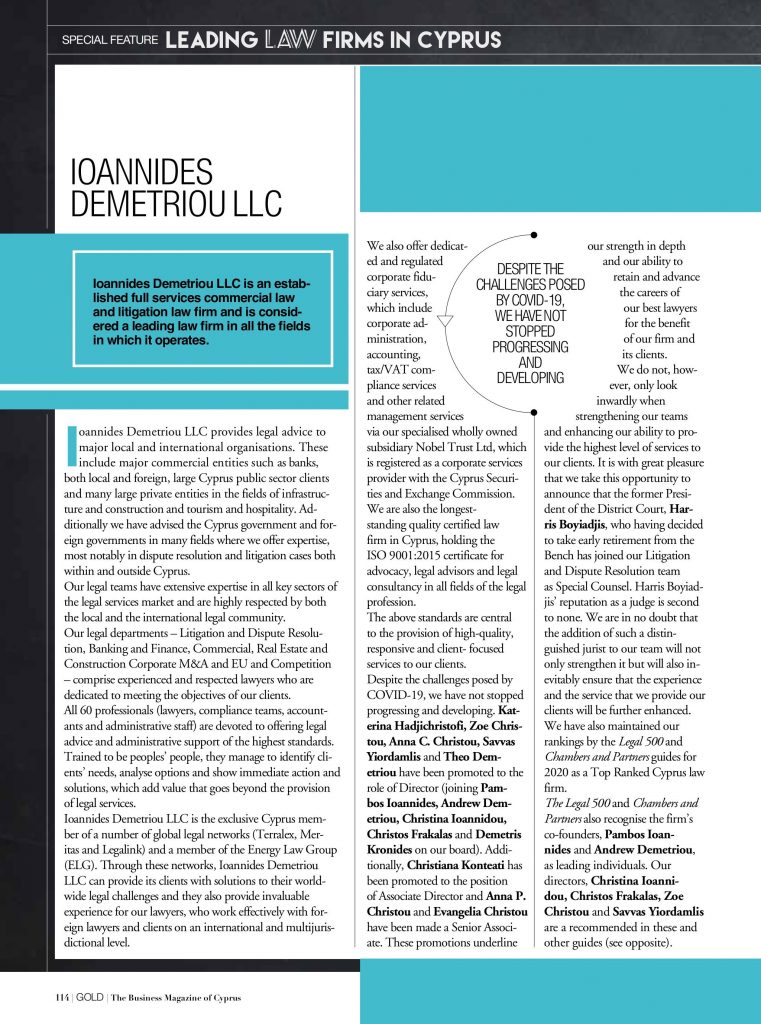Ηλιάνα Νικολαΐδου, Δικηγόρος – Ιωαννίδης Δημητρίου ΔΕΠΕ
Abstract:
Το παρόν άρθρο επιχειρεί να εξετάσει, από κριτική σκοπιά, τη νομική προστασία που μπορεί να λάβει το κυπριακό παραδοσιακό τυρί χαλλούμι στο δίκαιο της διανοητικής ιδιοκτησίας υπό το πρίσμα του δικαίου της Ευρωπαϊκής Ένωσης και, συγκεκριμένα, υπό το καθεστώς της Προστατευόμενης Ονομασίας Προέλευσης και το καθεστώς της Προστατευόμενης Γεωγραφικής Ένδειξης. Καθοριστικής σημασίας επί του ζητήματος είναι ο Κανονισμός 1151/2012, ο οποίος καθιερώνει το πλαίσιο και το περιεχόμενο της προστασίας που μπορεί να λάβει το συγκεκριμένο προϊόν υπό τα προαναφερθέντα καθεστώτα.
Λέξεις κλειδιά:
Προστατευόμενη Ονομασία Προέλευσης – Προστατευόμενη Γεωγραφική Ένδειξη – Χαλλούμι – Τυρί
Είναι αδιάψευστο, ότι η Ευρωπαϊκή Ένωση (ΕΕ) έχει χαράξει
μια κοινή γεωγραφική πολιτική, η οποία επιφέρει σημαντικά οφέλη στην ποιότητα
των ευρωπαϊκών προϊόντων και στους ευρωπαίους παραγωγούς και καταναλωτές.
Καρποί της εν λόγω πολιτικής ορίζονται ο Κανονισμός 2017/1001 για το σήμα της
ΕΕ[i] και ο Κανονισμός 1151/2012
για τα συστήματα ποιότητας των γεωργικών προϊόντων και τροφίμων της ΕΕ υπό το
πρίσμα των οποίων θα βασιστεί η ανάλυση του παρόντος άρθρου.[ii]
Με τον Κανονισμό 1151/2012 (εφεξής ως ο «Κανονισμός») και
λαμβάνοντας υπόψη την αυξημένη ζήτηση των Ευρωπαίων καταναλωτών για γεωργικά
προϊόντα και τρόφιμα υψηλής ποιότητας με ιδιαίτερα χαρακτηριστικά που
συνδέονται με ορισμένη γεωγραφική προέλευση, ο Ευρωπαίος νομοθέτης, με γνώμονα
τόσο το όφελος των γεωργών και των παραγωγών, όσο και το όφελος των
καταναλωτών, επιδιώκει τη θέσπιση κανόνων γνωστοποίησης των συγκεκριμένων
ιδιαίτερων χαρακτηριστικών.[iii] Ο Κανονισμός, εκκινώντας
από την ισχυρότερη προστασία και καταλήγοντας στην λιγότερο ισχυρή, καθιερώνει
τέσσερα διαφορετικά συστήματα προστασίας των γεωργικών προϊόντων και τροφίμων:
το σύστημα Προστατευόμενης Ονομασίας Προέλευσης[iv] (ΠΟΠ), το σύστημα των
Προστατευόμενων Γεωγραφικών Ενδείξεων[v] (ΠΓΕ), το σύστημα των
Εγγυημένων Παραδοσιακών Ιδιότυπων Προϊόντων[vi] (ΕΓΙΠ) και το σύστημα των
Προαιρετικών Ενδείξεων Ποιότητας[vii] (ΠΕΠ). Για τους σκοπούς
του παρόντος άρθρου, θα ακολουθήσει ανάλυση των δύο πρώτων συστημάτων.
Ο Κανονισμός διαμορφώνει ένα ολοκληρωμένο σύστημα για την
εφαρμογή, την καταχώριση, τη χρήση, την προστασία και τον επίσημο έλεγχο των
ΠΟΠ και ΠΓΕ στην ΕΕ, ώστε να αποφευχθεί η κατάχρηση, απομίμηση ή άλλη ψευδής ή παραπλανητική
ένδειξη των προστατευόμενων προϊόντων.[viii] Τα προϊόντα που
εμπίπτουν εντός της έννοιας των ΠΟΠ και ΠΓΕ διακατέχονται από μια πολιτιστική
διάσταση και εμπλουτίζονται με την ιδέα ότι διαφέρουν από τα κοινά προϊόντα,
αφού η φήμη τους πηγάζει από τη γεωγραφική τους προέλευση.[ix] Είναι δηλαδή, άρρηκτα συνδεδεμένα με τον τόπο καταγωγής
τους, καθότι, υπάρχει ένας ουσιαστικός δεσμός μεταξύ των χαρακτηριστικών τους
και της γεωγραφικής τους προέλευσης.[x]
Ειδικότερα, τα συστήματα ΠΟΠ και ΠΓΕ αποσκοπούν στην
εξασφάλιση δίκαιης απόδοσης για τους γεωργούς και τους παραγωγούς, όσον αφορά
τα στοιχεία ποιότητας και τα χαρακτηριστικά δεδομένου προϊόντος ή του τρόπου
παραγωγής του, και την παροχή σαφούς πληροφόρησης για προϊόντα με ιδιαίτερα
χαρακτηριστικά συνδεόμενα με τη γεωγραφική προέλευση, ώστε οι καταναλωτές να
είναι καλύτερα ενημερωμένοι όταν επιλέγουν τα προϊόντα κατά τη διαδικασία
αγοράς.[xi] Η προστασία δε, των ΠΟΠ
και ΠΓΕ παρέχεται μέσω ενός συστήματος καταχώρισης.[xii]
Παρατηρείται ότι οι κατ’ άρθρο 5 του Κανονισμού ορισμοί
των εννοιών ΠΟΠ και ΠΓΕ είναι παρόμοιοι. Ειδικότερα, και τα δύο συστήματα έχουν
την ίδια λειτουργία αναγνώρισης ενός προϊόντος ως προερχόμενου από συγκεκριμένο
τόπο.[xiii] Ωστόσο, υπάρχουν
συγκεκριμένες διαφορές, οι οποίες προσδίδουν στα προϊόντα ΠΟΠ μεγαλύτερη
προστασία συγκριτικά με τα προϊόντα ΠΓΕ.
Συγκεκριμένα, τα προϊόντα που αναγνωρίζονται ως ΠΟΠ,
έχουν ισχυρότερους δεσμούς με τον τόπο από τον οποίο κατάγονται[xiv] αφού όλα τα στάδια
παραγωγής τους πρέπει να πραγματοποιούνται σε αυτόν.[xv] Τονίζεται δε, ότι τα
προϊόντα ΠΟΠ συνδέονται έντονα με συγκεκριμένες περιοχές, στις οποίες
ενυπάρχουν ιδιαίτεροι φυσικοί ή ανθρώπινοι παράγοντες.[xvi] Οι φυσικοί και
ανθρώπινοι παράγοντες λαμβάνουν τη μορφή μιας σειράς μεταβλητών στοιχείων όπως
το κλίμα, οι γεωλογικές και υδρολογικές πτυχές, οι μέθοδοι επεξεργασίας, οι
τεχνικές γνώσεις, οι παραδοσιακές δεξιότητες και τα τοπικά έθιμα.[xvii] Εξίσου, η πηγή
έμπνευσης του συστήματος των ΠΟΠ είναι η ανάγκη
προστασίας των καταναλωτών.[xviii] Ως εκ τούτου, το
καθεστώς των ΠΟΠ επιβάλλει αυστηρές απαιτήσεις, οι οποίες εκπονούνται στις
προδιαγραφές των προϊόντων.[xix]
Αντιθέτως, τα προϊόντα ΠΓΕ έχουν μία πιο χαλαρή σύνδεση
με συγκεκριμένη τοποθεσία,[xx] παρά τη διατύπωση ότι τα
προϊόντα πρέπει να έχουν συγκεκριμένη ποιότητα, φήμη ή άλλα χαρακτηριστικά που
αποδίδονται στη γεωγραφική προέλευση,[xxi] καθώς για να
χαρακτηριστεί ένα προϊόν ως προϊόν ΠΓΕ, αρκεί μία μόνο φάση της παραγωγής του
να εκτελείται στην σχετική περιοχή. Συνεπώς, είναι δυνατό οι πρώτες ύλες να μην
προέρχονται απ’ αυτή την περιοχή.[xxii] Παράλληλα, μόνο ο
παράγοντας της φήμης είναι αρκετός για να δικαιολογήσει την προστασία ως ΠΓΕ.
Παρά τις προαναφερόμενες διαφοροποιήσεις στις
προδιαγραφές κατακύρωσης ενός προϊόντος ως ΠΟΠ ή ως ΠΓΕ, διατυπώνεται και η
γνώμη πως στην πρακτική εφαρμογή δεν υφίστανται ουσιαστικές διαφορές μεταξύ των
αναφερόμενων συστημάτων σχετικά με την ιδιαιτερότητα και την ποιότητά τους.
Προτείνεται, μάλιστα, ότι ο διαχωρισμός των δύο πρέπει να αρθεί.
Για λόγους πληρότητας, αναφέρεται πως έχουν καταχωρηθεί
εξακόσια σαράντα δύο ΠΟΠ και εφτακόσια πενήντα έξι ΠΓΕ σ’ ολόκληρη την ΕΕ.[xxiii] Όσον αφορά την
κυπριακή παραγωγή, ως ΠΟΠ έχει ήδη καταχωρηθεί το «κολοκάσι Σωτήρας / κολοκάσι
– πούλλες Σωτήρας», ενώ ως ΠΓΕ θεωρούνται το «γλυκό τριαντάφυλλου Αγρού», το
«παφίτικο λουκάνικο», η «κουφέτα αμυγδάλου Γεροσκήπου» και το «λουκούμι Γεροσκήπου».[xxiv]
Είναι γεγονός, ότι η πλειοψηφία των ονομασιών προϊόντων
που απολαμβάνουν την προστασία των ΠΟΠ σχετίζονται με τη γεωγραφική ονομασία
της περιοχής που παράγονται. Ενδεικτικά παραδείγματα αποτελούν τα ελληνικά
προϊόντα Πευκοθυμαρόμελο Κρήτης, Γαλανό Μεταγγιτσίου Χαλκιδικής, Τοματάκι
Σαντορίνης, Πράσινες Ελιές Χαλκιδικής, Φάβα Σαντορίνης και Σταφίδα Ζακύνθου.[xxv] Ωστόσο, ως ΠΟΠ δύνανται
να καταχωρηθούν και ονομασίες που δεν αποτελούν άμεσες γεωγραφικές ονομασίες,
όπως για παράδειγμα, η ονομασία «φέτα» ως τυρί προερχόμενο από την Ελλάδα.[xxvi]
Όσον αφορά την ονομασία «φέτα», υπήρξε έντονη διαμάχη και
προβληματισμός κατά πόσον αυτό το όνομα θεωρείται ως «γενικό», δηλαδή αν είναι
μια κοινή ονομασία για το είδος του τυριού.[xxvii] Δυνάμει δε, του άρθρου
3 του προγενέστερου Κανονισμού (ΕΟΚ) 2081/92 του Συμβουλίου, της 14ης Ιουλίου
1992, για την προστασία των γεωγραφικών ενδείξεων και των ονομασιών προέλευσης
των γεωργικών προϊόντων και των τροφίμων, ως κοινή ονομασία θεωρείτο το όνομα
ενός γεωργικού προϊόντος ή ενός τροφίμου το οποίο αν και αναφέρεται στον τόπο ή
την περιοχή όπου το εν λόγω γεωργικό προϊόν ή τρόφιμο έχει παραχθεί αρχικά ή
εμπορευθεί, έχει πλέον καταστεί κοινό όνομα ενός γεωργικού προϊόντος ή ενός
τροφίμου. Το πόρισμα της απόφασης για τη φέτα[xxviii] ήταν καθοριστικής
σημασίας. Το Δικαστήριο της ΕΕ (εφεξής ως «ΔΕΕ») αποφάνθηκε ότι παρά το γεγονός
ότι η «φέτα» και παρόμοιες εκφράσεις δεν συνιστούν αφ’ εαυτών μια περιοχή,
μπορούν να καταχωρηθούν ως ΠΟΠ εάν οι καταναλωτές συνδέουν το προϊόν με την
συγκεκριμένη περιοχή παραγωγής. Το ΔΕΕ συνυπολόγισε διάφορα στοιχεία σχετικά με
την κατανάλωση του προαναφερόμενου προϊόντος στα Κράτη Μέλη (εφεξής ως «ΚΜ»),
τα οποία υποδηλώνουν ότι η ονομασία «φέτα» δεν έχει χαρακτήρα κοινής ονομασίας[xxix] και, επομένως, δύναται
να αντιμετωπιστεί ως ΠΟΠ. Βασικός παράγοντας που ελήφθη υπόψη από το ΔΕΕ για να
αποφασίσει υπέρ της παροχής προστασίας ΠΟΠ, αποτέλεσε το γεγονός ότι σημαντικό
μέρος των Ευρωπαίων καταναλωτών, στην πραγματικότητα, αντιλαμβάνονταν την
«φέτα» ως τυρί συνδεόμενο με την Ελλάδα,[xxx] έστω και αν στην
πραγματικότητα είχε παραχθεί σε άλλο ΚΜ.[xxxi] Παράλληλα, το ΔΕΕ
συνεκτίμησε ότι στα άλλα ΚΜ, πλην της Ελλάδας, η φέτα διατίθεται συνήθως στο
εμπόριο με ετικέτες που παραπέμπουν στις ελληνικές πολιτιστικές παραδόσεις και
στον ελληνικό πολιτισμό.[xxxii]
Για το λόγο αυτό, ο Γενικός Εισαγγελέας, Dāmaso Ruiz-Jarabo Colomer, υποστήριξε πως η μνήμη του παρελθόντος επιδρά στην
εκτίμηση του κατά πόσον μια ονομασία προσλαμβάνεται ως κοινή, κυρίως
προκειμένου να καθοριστεί αν η ονομασία αυτή ανέκαθεν υπήρξε κοινή. Στην υπό
κρίση υπόθεση, η ιστορική αναδρομή είχε μεγάλη σημασία αφού φαίνεται πως, ήδη
από τα Ομηρικά έπη, η παρουσία του τυριού στην Αρχαία Ελλάδα ήταν σημαντική.
Περαιτέρω, το ΔΕΕ έλαβε υπόψη ότι στην ελληνική νομοθεσία
η ονομασία «φέτα» αναγνωρίζεται ως ΠΟΠ για το λευκό τυρί άλμης που παράγεται
παραδοσιακά στην Ελλάδα από γάλα πρόβειο ή μίγμα αυτού με γίδινο και
αποκλειστικά στις περιοχές Μακεδονίας, Θράκης, Ηπείρου, Θεσσαλίας, Στερεάς
Ελλάδας, Πελοποννήσου και του Νομού Λέσβου.[xxxiii] Υπήρξε επομένως, μια
σαφώς οριοθετούμενη περιοχή για την παραγωγή της φέτας που περιλαμβάνει
αποκλειστικά το ηπειρωτικό τμήμα της Ελλάδας, καθώς και τον Νομό Λέσβου.[xxxiv] Για όλους λοιπόν τους
προαναφερόμενους λόγους, το ΔΕΕ κατέληξε στο συμπέρασμα ότι η ονομασία «φέτα»
δεν είναι γενικής φύσης, με συνέπεια να μην επιτρέπεται σε παραγωγούς τυριών
εκτός της καθορισμένης περιοχής να αναφέρουν το προϊόν τους ως «τυρί φέτα» ή
«φέτα».[xxxv]
Όσον αφορά την χρήση ονομασίας «Χαλλούμι» (Halloumi)/«Hellim»,
είναι σημαντικό να λεχθεί ότι από το 2014 εκκρεμεί η διαδικασία για την
καθιέρωσή της ως ΠΟΠ αποκλειστικά για τυρί που παράγεται από κύπριους
παραγωγούς, χωρίς ωστόσο η εν λόγω διαδικασία να έχει μέχρι σήμερα ολοκληρωθεί.
Ταυτοχρόνως, η Κυπριακή Δημοκρατία αλλά και άλλες οντότητες όπως ο Οργανισμός
Κυπριακής Γαλακτοκομικής Βιομηχανίας και το Ίδρυμα Προστασίας του Παραδοσιακού
Τυριού της Κύπρου ονομαζόμενου χαλλούμι (εφεξής ως «Ίδρυμα»),
καταβάλλουν προσπάθειες για να εμποδίσουν ορισμένες εταιρίες να κάνουν χρήση
της ονομασίας «halloumi» ως σήμα.[xxxvi] Παράδειγμα αποτελεί η
υπόθεση C-766/18 στην οποία διαφαίνεται η προσπάθεια του Ιδρύματος, στο οποίο ανήκει το ευρωπαϊκό συλλογικό σήμα «HALLOUMI», να εμποδίσει βουλγαρική εταιρία να κατοχυρώσει εικονιστικό σήμα που
επίσης, αφορά τυρί και περιέχει τη λέξη «BBQLOUMI».[xxxvii]
Αξίζει να αναφερθεί ότι η ΓΕ, Juliane Kokott, ασπάζεται τη θέση τόσο του EUIPO (Γραφείο Διανοητικής Ιδιοκτησίας της ΕΕ) όσο και του Γενικού Δικαστηρίου
της ΕΕ, σύμφωνα με την οποία υποστηρίζεται ότι ο διακριτικός χαρακτήρας του
όρου «HALLOUMI» είναι ασθενής, επειδή περιγράφει το εν λόγω τυρί.[xxxviii] Επομένως, παρά την
κάποια ομοιότητα των όρων «HALLOUMI» και «BBQLOUMI», η χρήση του τελευταίου ονόματος δεν
εμπεριέχει κίνδυνο να συσχετιστεί από το ενδιαφερόμενο κοινό με τους παραγωγούς
που αποτελούν μέλη του Ιδρύματος.[xxxix] Ωστόσο, η απόφαση του
ΓΔΕΕ, ανατράπηκε από το ΔΕΕ στις 5 Μαρτίου του 2020,[xl] σύμφωνα με το οποίο, το γεγονός
ότι ο διακριτικός χαρακτήρας προγενέστερου σήματος είναι ασθενής δεν αποκλείει
την ύπαρξη κινδύνου συγχύσεως. Συνεπεία αυτού, αναπέμφθηκε η απόφαση πίσω στο
ΓΔΕΕ έτσι ώστε να προβεί σε σφαιρική εκτίμηση του κινδύνου συγχύσεως, η οποία
θα πρέπει να λαμβάνει υπόψη το σύνολο των κρίσιμων παραγόντων και τη μεταξύ
τους αλληλεξάρτηση.
Ενδιαφέρουσα δε, κρίνεται η σύγκριση του
συλλογικού σήματος «DARJEELING» με το συλλογικό σήμα «HALLOUMI» από την
ΓΕ Juliane Kokott, η οποία
σημείωσε ότι το συλλογικό σήμα «DARJEELING» αποτελεί ένα έξοχο παράδειγμα εφαρμογής του
συλλογικού ευρωπαϊκού σήματος επειδή αντιστοιχεί σε όνομα πόλης και περιοχής
της Ινδίας και ταυτοχρόνως ταυτίζεται με το φημισμένο μαύρο τσάι που
καλλιεργείται εκεί.[xli] Σε αντιδιαστολή,
το σήμα «HALLOUMI» δεν αντιστοιχεί σε ονομασία συγκεκριμένου τόπου, αλλά δύναται να
συσχετισθεί μόνον με έναν τόπο, δηλαδή με την Κύπρο, και αυτό υπό αμφισβήτηση
αφού φαίνεται πως τέτοιου είδους τυριά παράγονται και σ’ άλλες χώρες, συχνά υπό
τις ίδιες ή παρόμοιες ονομασίες.[xlii]
Υποστηρίζεται δε, πως η απόλαυση του συστήματος ΠΟΠ δίδεται σε μια ολόκληρη
χώρα μόνο «σε εξαιρετικές περιπτώσεις» και
κυρίως όταν το ΚΜ είναι μικρού μεγέθους.[xliii] Διαμέσου αυτής της σύγκρισης, εύλογα θα μπορούσε να λεχθεί ότι θα
υπήρχαν μεγαλύτερες πιθανότητες έγκρισης της αίτησης για την ονομασία «Χαλλούμι» (Halloumi) / «Hellim» ως ΠΟΠ, εάν το προϊόν με την εν λόγω ονομασία περιοριζόταν σε συγκεκριμένες
περιοχές της Κυπριακής Δημοκρατίας και όχι σ’ όλη την επικράτειά της.
Σε περίπτωση δε
αποτυχίας για καταχώρηση του χαλλουμιού ως ΠΟΠ, η Κυπριακή Δημοκρατία μπορεί να
λάβει τα κατάλληλα μέτρα προκειμένου να προστατεύσει το εν λόγω προϊόν υπό το
καθεστώς των ΠΓΕ. Ωστόσο, η παροχή προστασίας υπό το συγκεκριμένο καθεστώς θα
είναι μικρότερης εμβέλειας, καθώς το προϊόν θα έχει μια ασθενή σύνδεση με την Κυπριακή Δημοκρατία και αυτό θα έχει ως
αποτέλεσμα την ενθάρρυνση άλλων παραγωγών, εκτός της Κυπριακής Δημοκρατίας, να
καρπώνονται τη φήμη του προϊόντος με την μόνη υποχρέωση να διεκπεραιώνουν μόνο
ένα στάδιο της παραγωγής εντός της οριοθετημένης περιοχής.
Θεωρείται αδιαμφισβήτητο
ότι η ΕΕ έχει διαμορφώσει ένα σημαντικό σύστημα προστασίας των ευρωπαϊκών προϊόντων.
Έντονη ωστόσο διαμάχη παρατηρείται, κατά την προσπάθεια κατοχύρωσης μιας
απόλυτης προστασίας προς όφελος του κυπριακού τυριού «Χαλλούμι» από την
Κυπριακή Δημοκρατία και από κυπριακές οργανώσεις και ιδρύματα. Ως απόρροια των
προαναφερθέντων, η Κυπριακή Δημοκρατία οφείλει να προβεί άμεσα στη διεκπεραίωση
ενεργειών που εξασφαλίζουν την ισχυρή προστασία του χαλλουμιού και κατ’
επέκταση, της παράδοσης της. Έχει δε υποχρέωση, να εντείνει τις πολιτικές
διαπραγματεύσεις και να συλλέξει τα απαραίτητα στοιχεία που αποδεικνύουν την
προέλευση του εν λόγου προϊόντος, ώστε να εγκριθεί ως ΠΟΠ ή ως ΠΓΕ. Παράλληλα, θα
πρέπει μέσω πολιτικών πρωτοβουλιών να συνάψει διμερείς συνθήκες με ΚΜ της ΕΕ
αλλά και τρίτα Κράτη, οι οποίες θα αναγνωρίζουν την κυπριακή προέλευση του
χαλλουμιού και θα διασφαλίζουν την θωράκιση της ποιότητας του και κατ’ επέκταση
της κυπριακής παράδοσης.
[i] Κανονισμός (ΕΕ)
2017/1001 του Ευρωπαϊκού Κοινοβουλίου και Συμβουλίου, της 14ης Ιουνίου 2017,
για το σήμα της Ευρωπαϊκής Ένωσης.
[ii] Κανονισμός (ΕΕ)
αριθ. 1151/2012 του Ευρωπαϊκού Κοινοβουλίου και Συμβουλίου, της 21ης Νοεμβρίου
2012, για τα συστήματα ποιότητας των γεωργικών προϊόντων και τροφίμων.
[iii] M. Gragnani, ‘The EU Regulation
1151/2012 on Quality Schemes for Agricultural Products and Foodstuffs’ (2013) 8
Eur Food & Feed L Rev, 377
[iv] Κανονισμός (ΕΕ)
αριθ. 1151/2012, άρθρο 5(1).
[v] Κανονισμός (ΕΕ)
αριθ. 1151/2012, άρθρο 5(2).
[vi] Κανονισμός (ΕΕ)
αριθ. 1151/2012, άρθρο 17.
[vii] Κανονισμός (ΕΕ)
αριθ. 1151/2012, άρθρο 27.
[viii] Κανονισμός (ΕΕ) αριθ. 1151/2012, άρθρο 13.
[ix] X. Wang, ‘Absolute protection for
geographical indications: protectionism or justified rights?’ (2018) 8 (2)
Queen Mary Journal of Intellectual Property, 81
[x] Κανονισμός (ΕΕ) αριθ.
1151/2012, αιτιολογική σκέψη 17
[xi] Κανονισμός (ΕΕ)
αριθ. 1151/2012, αιτιολογική σκέψη 18.
[xii] P. Munzinger, ‘Blue
jeans and other GIs: an overview of protection systems for geographical
indications’, (2012) 7 Journal of Intellectual Property Law & Practice, No.
4, 287.
[xiii] M. Gragnani, ‘The EU Regulation
1151/2012 on Quality Schemes for Agricultural Products and Foodstuffs’ (2013) 8
Eur Food & Feed L Rev, 378.
[xiv] Ευρωπαϊκή Επιτροπή «Quality schemes explained» (2019)
Europa.eu reference
[xv] T. Jovanić and M. Cogoljević and D.
Pejović, ‘Buy national, campaigns and food country of origin labelling – EU
legal framework and its relevance for Serbia’ (2018) 1293.
[xvi] H. V. J. Moir,
‘Understanding EU trade policy on geographical indications’ (2017) 12th Annual epip Conference: Claims on Area: The geography-IP interface,
University of Bordeaux, 5.
[xvii] M. Gragnani, ‘The EU Regulation
1151/2012 on Quality Schemes for Agricultural Products and Foodstuffs’ (2013) 8
Eur Food & Feed L Rev, 378.
[xviii] H. V. J. Moir, ‘Understanding EU trade policy on geographical indications’ (2017) 12th Annual epip Conference: Claims on Area: The geography-IP interface, University of Bordeaux, 4.
[xix] T. Jovanić and M. Cogoljević and D.
Pejović, ‘Buy national, campaigns and food country of origin labelling – EU
legal framework and its relevance for Serbia’ (2018) 1293.
[xx] M. Gragnani, ‘The EU Regulation
1151/2012 on Quality Schemes for Agricultural Products and Foodstuffs’ (2013) 8
Eur Food & Feed L Rev, 378.
[xxi] H. V. J. Moir, ‘Understanding EU trade policy on geographical indications’ (2017) 12th Annual epip Conference: Claims on Area: The geography-IP interface, University of Bordeaux, 4.
[xxii] M. Gragnani, ‘The EU Regulation
1151/2012 on Quality Schemes for Agricultural Products and Foodstuffs’ (2013) 8
Eur Food & Feed L Rev, 378.
[xxiii] Ευρωπαϊκή Επιτροπή «Agriculture and food» (2019)
Europa.eu reference
[xxiv] Ευρωπαϊκή Επιτροπή «Agriculture and food» (2019)
Europa.eu reference
[xxv] Ευρωπαϊκή Επιτροπή «Agriculture and food» (2019)
Europa.eu reference
[xxvi] B. O’Connor, ‘Sui Generis Protection of
Geographical Indications’ (2004) 9 Drake J Agric L, 363.
[xxvii] M. Omachi, ‘A Tale of
Two Approaches: Analysis of Responses to EU’s FTA Initiatives on Geographical
Indications (GIS)’ (2019) 18 Chi-Kent J Intell Prop, 158.
[xxviii] Συνεκδικασθείσες υποθέσεις C-465/02 και C-466/02, Ομοσπονδιακή Δημοκρατία
της Γερμανίας (C-465/02) και Βασίλειο της Δανίας (C-466/02) κατά Επιτροπής των Ευρωπαϊκών Κοινοτήτων, (2005) ECLI:EU:C:2005:636.
[xxix] Συνεκδικασθείσες υποθέσεις C-465/02 και C-466/02, Ομοσπονδιακή Δημοκρατία
της Γερμανίας (C-465/02) και Βασίλειο της Δανίας (C-466/02) κατά Επιτροπής των Ευρωπαϊκών Κοινοτήτων, (2005) ECLI:EU:C:2005:636, σκέψη 88.
[xxx] A. Profeta and R. Balling and V.
Schoene and A. Wirsig, ‘The Protection of Origins for Agricultural Products and
Foods in Europe: Status Quo, Problems and Policy Recommendations for the Green
Book’ (2009) 12 J World Intell Prop 628.
[xxxi] Συνεκδικασθείσες υποθέσεις C-465/02 και C-466/02, Ομοσπονδιακή Δημοκρατία
της Γερμανίας (C-465/02) και Βασίλειο της Δανίας (C-466/02) κατά Επιτροπής των Ευρωπαϊκών Κοινοτήτων, (2005) ECLI:EU:C:2005:636, σκέψη 87.
[xxxii] Συνεκδικασθείσες υποθέσεις C-465/02 και C-466/02, Ομοσπονδιακή Δημοκρατία
της Γερμανίας (C-465/02) και Βασίλειο της Δανίας (C-466/02) κατά Επιτροπής των Ευρωπαϊκών Κοινοτήτων, (2005) ECLI:EU:C:2005:636, σκέψη 87.
[xxxiii] Συνεκδικασθείσες υποθέσεις C-465/02 και C-466/02, Ομοσπονδιακή Δημοκρατία
της Γερμανίας (C-465/02) και Βασίλειο της Δανίας (C-466/02) κατά Επιτροπής των Ευρωπαϊκών Κοινοτήτων, (2005) ECLI:EU:C:2005:636, σκέψη 87.
[xxxiv] Συνεκδικασθείσες υποθέσεις C-465/02 και C-466/02, Ομοσπονδιακή Δημοκρατία
της Γερμανίας (C-465/02) και Βασίλειο της Δανίας (C-466/02) κατά Επιτροπής των Ευρωπαϊκών Κοινοτήτων, (2005) ECLI:EU:C:2005:636, σκέψη 53.
[xxxv] Συνεκδικασθείσες υποθέσεις C-465/02 και C-466/02, Ομοσπονδιακή Δημοκρατία
της Γερμανίας (C-465/02) και Βασίλειο της Δανίας (C-466/02) κατά Επιτροπής των Ευρωπαϊκών Κοινοτήτων, (2005) ECLI:EU:C:2005:636, σκέψεις 1187, 88, 100.
[xxxvi] Προτάσεις της
Γενικής Εισαγγελέα, Juliane Kokott, της 17ης
Οκτωβρίου 2019, ECLI:EU:C:2019:881,
σκέψη 1.
[xxxvii] Προτάσεις της
Γενικής Εισαγγελέα, Juliane Kokott, της 17ης
Οκτωβρίου 2019, ECLI:EU:C:2019:881,
σκέψη 2.
[xxxviii] Προτάσεις της
Γενικής Εισαγγελέα, Juliane Kokott, της 17ης
Οκτωβρίου 2019, ECLI:EU:C:2019:881,
σκέψη 3.
[xxxix] Προτάσεις της
Γενικής Εισαγγελέα, Juliane Kokott, της 17ης
Οκτωβρίου 2019, ECLI:EU:C:2019:881,
σκέψη 3.
[xl] C-766/18 P – Foundation for the
Protection of the Traditional Cheese of Cyprus named Halloumi κατά EUIP, ECLI:EU:C:2020:170.
[xli] Προτάσεις της
Γενικής Εισαγγελέα, Juliane Kokott, της 17ης
Οκτωβρίου 2019, ECLI:EU:C:2019:881,
σκέψη 59.
[xlii] Προτάσεις της
Γενικής Εισαγγελέα, Juliane Kokott, της 17ης
Οκτωβρίου 2019, ECLI:EU:C:2019:881,
σκέψη 69.
[xliii] Προτάσεις του
Γενικού Εισαγγελέα Damaso Ruiz-Jarabo Colomer, της 10ης Μαΐου 2005,
ECLI:EU:C:2005:276, σκέψη 33.




